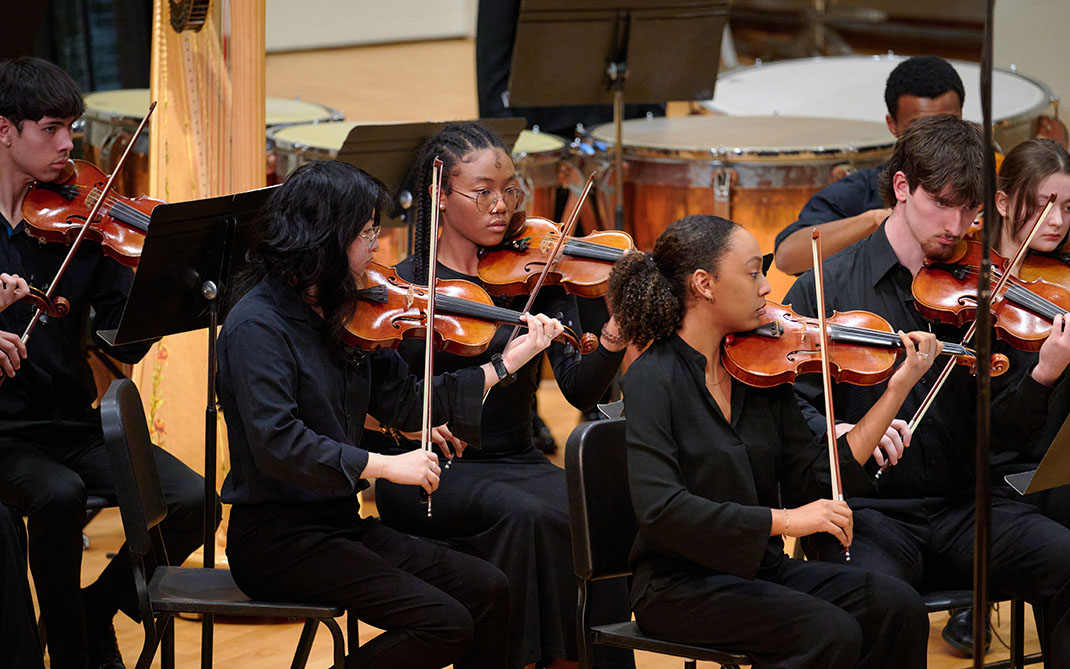UNCSA joins JED Campus program to support student mental health
The University of North Carolina School of the Arts is one of only five schools in the state to partner with the Jed Foundation, a national nonprofit dedicated to preventing suicide, reducing substance abuse and improving well-being among teenagers and young adults. UNCSA received a $30,000 Behavioral Health Grant from the University of North Carolina System in January 2018 to create a comprehensive strategic plan for mental health services on campus over the next four years.
As the country observes National Suicide Prevention Awareness Month in September, faculty and staff members at UNCSA will meet with consultants from the New York-based foundation to assess the welfare of students on campus. Students have completed JED’s Healthy Minds Survey and faculty and staff have completed an internal survey to provide baseline information for the assessment.

Clinical Case Manager Laurel Banks
The Jed Foundation was created by Donna and Phil Satow, who lost their youngest son, Jed, to suicide in 1998.
“The college years are the age when many mental health issues first manifest, and it can be a time of significant stress and pressure,” said John MacPhee, executive director of the Jed Foundation. “JED Campus helps schools by working with them to survey everything their university is doing to support their students’ emotional health, and find practical ways to augment these efforts in a comprehensive way. We believe that the implementation of a campus-wide approach to mental health will lead to safer, healthier communities, and likely greater student retention.”
UNCSA has formed an interdisciplinary team of senior administrators, faculty, Student Affairs and police personnel, counselors and health practitioners who will oversee the JED Campus program.
Clinical Case Manager Laurel Banks, who worked with Senior Mental Health Counselor Annamarie Gallagher to secure the UNC grant, said the foundation’s support is important because of growing numbers of students who report persistent feelings of sadness and thoughts of suicide. Banks pointed to a 2017 study by the Centers for Disease Control that showed 31.5 percent of high school students said they felt sad or hopeless almost every day for two weeks or more in the past year. That number was up from 18.5 percent in 2007.
Another study by the Center for Collegiate Mental Health (CCMH) showed growing percentages of students had serious thoughts of suicide or had attempted suicide over the past seven years.
Gallagher said anxiety and depression are the most common reasons for seeking support, nationally and at UNCSA. In its 2017 annual report, CCMH said the number of students receiving counseling for anxiety rose from 18 to 30 percent over the past four years and the number of students treated for depression rose from 15 percent to about 17 percent.

Senior Mental Health Counselor Annamarie Gallagher
“Those experiences, without intervention, can inform many harmful behaviors, from alcohol and drug abuse to self-harm, eating disorders, and thoughts of suicide, “ Gallagher said. “With assistance from the Jed Foundation, we hope to improve the well-being of our students, to help them succeed here and develop the resilience to lead full lives regardless of the challenges they may face. A sense of community is a primary contributor to resilience, and with a campus-wide approach to well-being we hope to increase those connections for students.”
Banks said that UNCSA, like most campuses, is challenged to meet the demand for mental health services, with more than one-fourth of UNCSA students seeking counseling services, compared to the national average of about 10 percent. UNCSA has three full-time mental health counselors, including a clinical director, a part-time graduate intern and a part-time psychiatrist who manages medications. As clinical case manager, Banks coordinates student support services across the campus along with a second, part-time case manager.
“If a student’s needs exceed our capacity, I try to find resources in the community,” Banks said. “Students pursuing careers in the arts experience a lot of pressure, and many are away from home for the first time, living in a new environment,” she added. “Artists tend to be highly intuitive and they are often open to seeking help when they need it.”
A sense of community is a primary contributor to resilience, and with a campus-wide approach to well-being we hope to increase those connections for students.
Annamarie Gallagher
Banks said that because UNCSA is such a small campus (total enrollment around 1300), one student’s destructive behavior can ripple throughout the close-knit community. “Students know each other. They feel empathy for one another. Our community is stronger, more productive and creative when each of its members is nurtured,” she said. “That is the goal of our interdisciplinary team, to prevent even one student from falling between the cracks. The Jed Foundation will help us identify any cracks that we might have.”
In North Carolina, Appalachian State University, Wake Forest University, Elon University and Davidson College were previously designated as JED Campuses. Nationally more than 200 schools participate in the program, which offers a comprehensive, public health approach to promoting emotional well-being and preventing suicide and serious substance abuse. JED’s programs use an evidence-based model to assess efforts currently underway on campus and to identify existing strengths and areas for improvement.
Last December, the 17 campuses of the UNC System convened to discuss the challenges of meeting the increased need for mental health services, and schools were invited to apply for funding to assist in the creation or advancement of campus-based initiatives that promoted behavioral health and wellness for their students. UNCSA was one of eight campuses that received the grants.
Banks said without the grant, UNCSA would not have been able to afford the JED Campus program. “It’s our mission to help students succeed,” she said. “The strategic planning made possible through the Jed Foundation will help us better serve our students for years to come.”
About JED Campus
JED Campus is a nationwide initiative of the Jed Foundation designed to empower schools with a framework and customized support to enhance student mental health and suicide and substance abuse prevention efforts. By becoming a member of the JED Campus program, a school demonstrates a commitment to the emotional well-being of its students. JED Campus schools embark on a multi-year strategic collaboration that not only assesses and enhances the work that is already being done, but helps create positive, lasting, systemic change in the campus community.
About the Jed Foundation
JED is a national nonprofit that exists to protect the emotional health of our country’s 40 million high school and college students and reduce the risks of substance abuse and suicide. We collaborate with schools to enhance their mental health and suicide prevention programming and systems; develop expert resources and create powerful partnerships so that students have the support they need, when and how they need it; and educate and empower young adults, families and the community to take action for the cause. Together, we’re ensuring America’s students grow into thriving adults.
September 10, 2018







